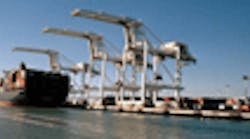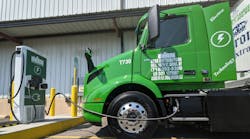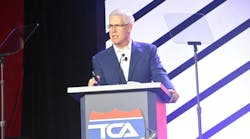A new study released by the Pacific Institute and the East Bay Alliance for a Sustainable Economy said Oakland Port truck diesel pollution costs $153 million annually in health expenses in the Oakland area. As a result, the authors encourage the port to adopt a Clean Ports Program similar to those implemented by the Ports of Los Angeles and Long Beach.
“We’re not only interested in gathering information that shines light on what’s not working at the Port, but we also wanted to offer workable solutions,” said study co-author Jennifer Lin, research director, East Bay Alliance for a Sustainable Economy. “In our view, the only sustainable solution is for the Port to adopt a Clean Trucks Program that makes the goods movement industry take responsibility for cleaning up the truck fleet by hiring drivers as employees rather than ‘independent contractors.’”
According toTaking a Toll: The high cost of health, environmental, and worker impacts of the Oakland Port tucking system, port truck diesel emissions pollute surrounding neighborhoods and contribute to premature death, asthma, increased cancer risk, and other diseases. The port also effects neighborhoods through noise and vibration, reduced pedestrian visibility, lower neighborhood walkability, and increased environmental stress.
A new study released by the Pacific Institute and the East Bay Alliance for a Sustainable Economy said Oakland Port truck diesel pollution costs $153 million annually in health expenses in the Oakland area. As a result, the authors encourage the port to adopt a Clean Ports Program similar to those implemented by the Ports of Los Angeles and Long Beach.
“We’re not only interested in gathering information that shines light on what’s not working at the Port, but we also wanted to offer workable solutions,” said study co-author Jennifer Lin, research director, East Bay Alliance for a Sustainable Economy. “In our view, the only sustainable solution is for the Port to adopt a Clean Trucks Program that makes the goods movement industry take responsibility for cleaning up the truck fleet by hiring drivers as employees rather than ‘independent contractors.’”
According toTaking a Toll: The high cost of health, environmental, and worker impacts of the Oakland Port tucking system, port truck diesel emissions pollute surrounding neighborhoods and contribute to premature death, asthma, increased cancer risk, and other diseases. The port also effects neighborhoods through noise and vibration, reduced pedestrian visibility, lower neighborhood walkability, and increased environmental stress.
The report also stated that port truck drivers face unhealthy working conditions and lack workers’ compensation and employer-based health insurance, which costs taxpayers $4.5 million annually to underwrite emergency or public healthcare coverage. In addition, one-fifth of West Oakland children have asthma and truck drivers at the port have a thousand-fold elevated cancer risk, the study concluded.
According to the study’s authors, the port has been studying the problem for the past two years but currently has no plan to come into compliance with new California clean truck standards scheduled to go into effect in January 2010.
“Community residents and workers know all too well the ‘real costs’ of Port trucking operations: they feel it in effects on their health, on their safety, on their neighborhoods,” said Swati Prakash, senior research associate at the Pacific Institute’s Community Strategies for Sustainability and Justice Program and co-author of the report. “Our analysis begins to put a quantifiable price tag on these costs that are paid for by the public for this part of the freight transportation industry, and in doing so, give communities concrete evidence to work with in advocating for improvements.”
Taking a Toll’s authors recommend that the Port of Oakland should create a uniform and comprehensive set of standards covering environmental impacts and working conditions for companies that do business at the Oakland port, and enforcing adherence to the standards by shifting port trucking to a concession model with employee status.
However, both the American Trucking Assns. (ATA) and the Federal Maritime Commission (FMC) are trying to secure an injunction against the Ports of Los Angeles and Long Beach over their concession plans.




